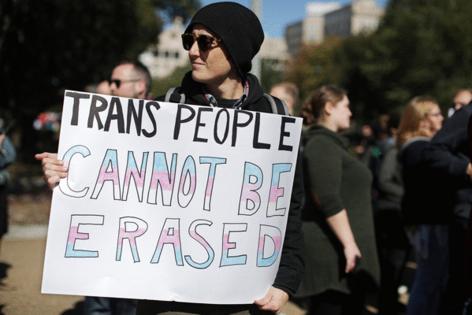DOJ accuses judge of 'misconduct' in transgender military ban case
Published in News & Features
WASHINGTON — The federal judge in Washington, D.C., overseeing a challenge to President Donald Trump’s ban on transgender people serving in the military was accused by the U.S. Justice Department of misconduct for alleged bias during recent court hearings.
U.S. District Judge Ana Reyes allegedly treated the Justice Department’s lawyer with disrespect during two hearings earlier this week, Attorney General Pam Bondi’s chief of staff, Chad Mizelle, said in a letter to the chief judge of the U.S. Court of Appeals for D.C. Circuit, which handles such complaints.
DOJ officials contend that Reyes repeatedly violated the official code of conduct for district court judges, including by improperly grilling DOJ lawyer Jason Lynch about the government’s position that there are only two sexes, according to the letter, a copy of which was provided by the Justice Department.
“It was during these lines of questioning that Judge Reyes engaged in the unacceptable misconduct at issue in this complaint, questioning a Department of Justice attorney regarding his religious beliefs and then using him unwillingly as a physical prop in her courtroom theatrics,” according to the letter.
Trump faces a slew of challenges to executive orders he signed after taking office last month, including several taking aim at the rights of transgender Americans. It’s rare for the Justice Department to lodge formal complaints against judges, let alone to publicize it. The complaint shows the department taking a more adversarial approach to pushing back on the judiciary under Trump, who has criticized judges who rule against him.
Reyes, who took the bench in February 2023 after being appointed by former President Joe Biden, is currently weighing a request by the six transgender service members who filed the lawsuit to issue a preliminary injunction that could put the executive order on hold while the case proceeds.
The Justice Department asked the appeals court to investigate whether there is a “pattern of misconduct” by Reyes and suggested that unspecified “appropriate action be taken” to prevent it from happening again.
Under the judiciary’s rules, D.C. Circuit Chief Judge Sri Srinivasan will decide whether to dismiss the complaint or appoint a committee of judges to investigate. Judicial misconduct proceedings usually are not public, but decisions can become public later.
A person who answered the phone in Reyes’ chambers said the judge declined to comment. A DOJ spokesperson also declined to comment.
The government has had some success in the case. Reyes declined to quickly rule on the injunction as requested by the plaintiffs, deciding instead to wait until Defense Secretary Pete Hegseth issues his formal guidance on how he’ll implement the ban.
Another hearing on the request has been set for March 3.
Reyes also engaged at times in seemingly friendly banter with Lynch, but the government says some of her comments went too far, including her hypothetical scenario involving University of Virginia School of Law graduates.
“My new standing order says that no one who has graduated from UVA Law School can appear before me,” Reyes said to Lynch after a break, according to the letter. She continued her analogy by explaining the UVA graduates were being banned because “they’re all liars and lack integrity,” the letter said.
The DOJ also took issue with Reyes using an analogy during the hearing about what Jesus would say if transgender people were banned from homeless shelters.
“What do you think Jesus would say to telling a group of people that they are so worthless, so worthless that we’re not going to allow them into homeless shelters?” Reyes said at the hearing. “Do you think Jesus would be, ‘Sounds right to me?’ Or do you think Jesus would say, ‘WTF? Of course, let them in!’”
The line of questioning was “deeply problematic” and had “no relevance to the legal analysis,” the Justice Department said.
The expected ruling by Reyes will impact an estimated 15,000 transgender service members, from across the military. Trump said in the executive order that the presence of transgender people in the military undermined readiness and cohesion, and questioned their integrity and honesty.
_______
(With assistance from Chris Strohm.)
_____
©2025 Bloomberg L.P. Visit bloomberg.com. Distributed by Tribune Content Agency, LLC.







Comments